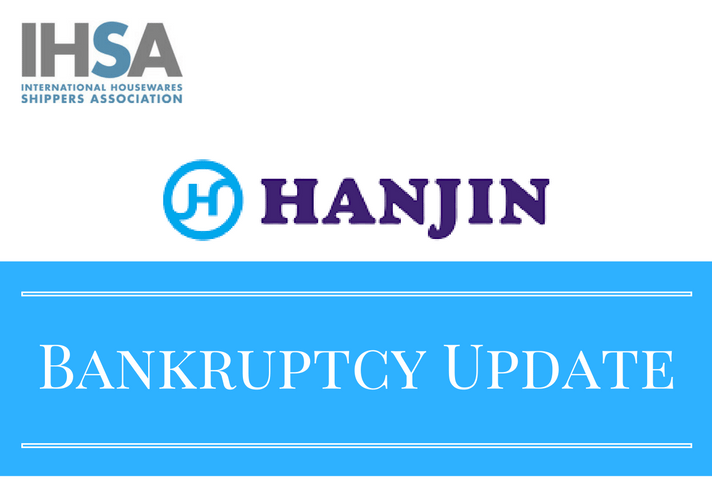By: David P. Street and Brendan Collins, IHSA Legal Council
As you are probably aware, Hanjin filed for bankruptcy protection in Korea on Wednesday August 31st. The filing came just a day after the company creditor’s discontinued financial assistance of more than USD $896 million to keep the company operating. The Korean bankruptcy court will determine whether Hanjin should be liquidated or given a chance to restructure.
The press is reporting that one Hanjin vessel, the Hanjin Rome, was seized by a creditor in Singapore on Monday. The press is also reporting that a number of ports, including ports in China (Shanghai, Xiamen), Spain (Valencia) and the United States (Savannah), have blocked access to Hanjin ships due to concerns Hanjin would not be able to pay port fees. The bankruptcy filing and the actions of the ports and at least one creditor raise a number of questions. One issue is whether the court will issue a stay prohibiting Hanjin’s creditors from seizing assets (e.g., vessels) to satisfy their claims. It is likely that the Korean court will do so given Hanjin’s size and importance. A second issue, however, is whether any such stay would bind foreign creditors in ports where Hanjin vessels may call. Because it is doubtful that foreign creditors with no operations in Korea will pay much attention to an order of a Korean court, Hanjin likely would have to seek an injunction blocking vessel seizures in all countries where Hanjin ships are located. This would be a pretty large undertaking. And, while it is difficult to predict with certainty whether courts in various countries will issue injunctions blocking the seizure of Hanjin vessels, it is certain that the cargo on any vessel that is denied access to a port or seized will be delayed and will likely incur extra costs.
Any supplier of goods to Hanjin’s vessels has a lien on the vessel to secure payment of what they are owed so there are potentially a lot of foreign creditors that exist. And, once one of the vessels is seized, it is likely that other foreign creditors would rush to do the same thing to protect their interests. This is when events could take on a life of their own and spin out of control. There is not much that can be done about shipments that are already on Hanjin vessels. We have heard from an inside source at Hanjin that it intends to “protect” such current shipments, which probably means at the least that it will endeavor to complete voyages in progress and deliver the goods (to the extent that the vessel is allowed to enter the port.)
If a vessel is arrested, and Hanjin does not — or cannot — put up a bond to obtain its release, it is probable some third party will be appointed to arrange for disposition of the goods. The goods themselves will not be subject to a creditor’s lien; however, freight charges owed on collect shipments will probably have to be paid because they will be considered Hanjin’s assets. It is also probable that shippers may have to make their own arrangements for on-carriage of their containers. For containers that have been shipped with other carriers and loaded on Hanjin vessels pursuant to vessel sharing arrangements, the issue will be how much responsibility those carriers will take for making the arrangements for on-carriage in the event the Hanjin vessel is seized. As you can see, there are a variety of possible outcomes here. Which of the possible outcomes actually occur which will depend upon how this situation unfolds and what actions third parties take.
We also recommend that you not pay Hanjin for the transportation of cargo until goods are actually delivered into your possession and control.
- The contents of this article do not constitute legal advice. You should always consult an experienced attorney about legal issues that arise from particular situations as the individual facts may warrant different legal conclusions in a given case. Mr. Street is a partner at the law firm of GKG Law, P.C. and serves as IHSA’s FMC attorney.
The International Housewares Shippers Association (IHSA) is a not-for-profit association formed to benefit companies belonging to the International Housewares Association (IHA). Through the combined leverage of members, IHSA negotiates freight contracts and partners with other logistics providers to lower supply chain costs.
IHSA’s main function is to negotiate the lowest possible transportation rates and provide the highest quality service for all participating members. Additionally, IHSA members receive valuable market intelligence and advice through regular newsletters and briefings.
IHA member companies looking to reduce their ocean freight costs or have questions about an ocean freight issue are encouraged to contact IHSA to learn about the program. Contact IHSA at +1-513-489-4743 and learn more on our website.




